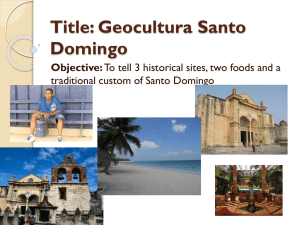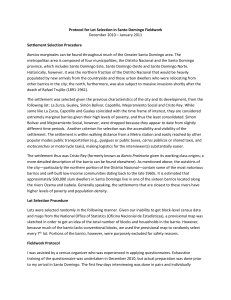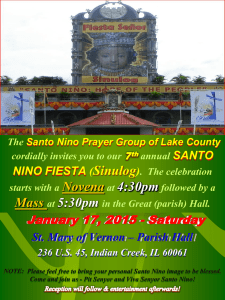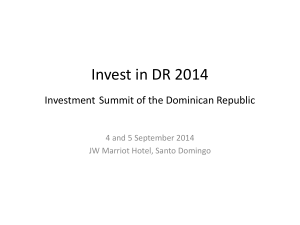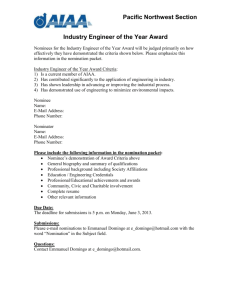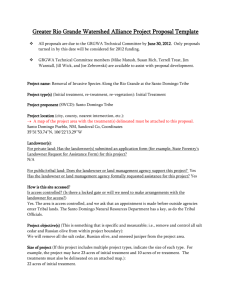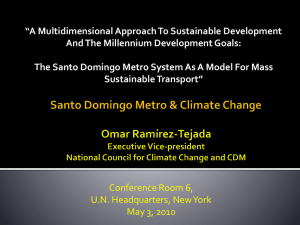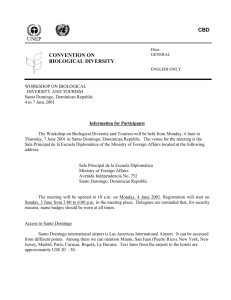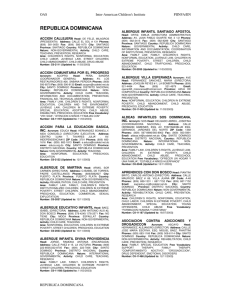marine coastal biodiversity
advertisement
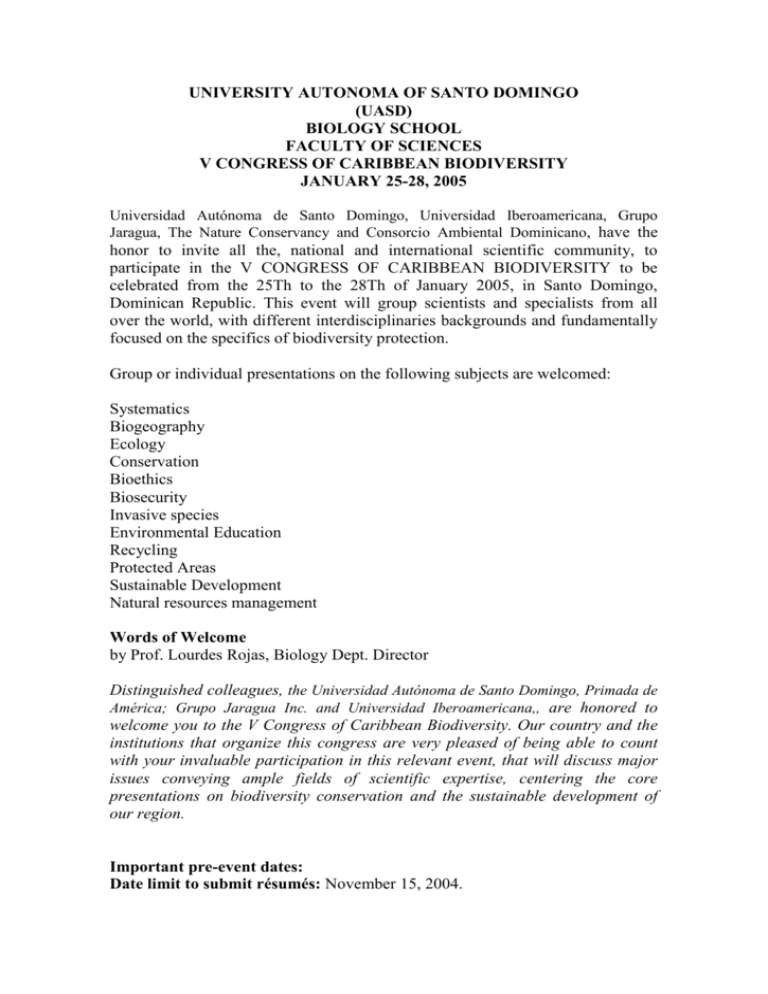
UNIVERSITY AUTONOMA OF SANTO DOMINGO (UASD) BIOLOGY SCHOOL FACULTY OF SCIENCES V CONGRESS OF CARIBBEAN BIODIVERSITY JANUARY 25-28, 2005 Universidad Autónoma de Santo Domingo, Universidad Iberoamericana, Grupo Jaragua, The Nature Conservancy and Consorcio Ambiental Dominicano, have the honor to invite all the, national and international scientific community, to participate in the V CONGRESS OF CARIBBEAN BIODIVERSITY to be celebrated from the 25Th to the 28Th of January 2005, in Santo Domingo, Dominican Republic. This event will group scientists and specialists from all over the world, with different interdisciplinaries backgrounds and fundamentally focused on the specifics of biodiversity protection. Group or individual presentations on the following subjects are welcomed: Systematics Biogeography Ecology Conservation Bioethics Biosecurity Invasive species Environmental Education Recycling Protected Areas Sustainable Development Natural resources management Words of Welcome by Prof. Lourdes Rojas, Biology Dept. Director Distinguished colleagues, the Universidad Autónoma de Santo Domingo, Primada de América; Grupo Jaragua Inc. and Universidad Iberoamericana,, are honored to welcome you to the V Congress of Caribbean Biodiversity. Our country and the institutions that organize this congress are very pleased of being able to count with your invaluable participation in this relevant event, that will discuss major issues conveying ample fields of scientific expertise, centering the core presentations on biodiversity conservation and the sustainable development of our region. Important pre-event dates: Date limit to submit résumés: November 15, 2004. Changes in résumés can be accepted until November 30, 2004. Place of the Event: Salón La Mancha, Hotel Lina, Santo Domingo, Dominican Republic Visas: It is important to verify with your embassy if you need a visa to the Dominican Republic. Climate: January and February are the months of lower temperatures in the country. The same ones can fluctuate between 22 and 27°C. At dawn they can descend until 18°C. Transport: Airport-Hotel-Airport The transport from and towards the airport must be covered by each participant. In order to save fares, we will offer some options for groups in a same flight or coincident arrivals. Presentations (simultaneous translation): Oral: Twenty (20) minutes, seventeen minutes (17) for presentation and three minutes (3) for questions and answers. Symposia: Thirty (30) minutes, twenty-five (25) minutes for presentation and five (5) minutes for questions and answers. Public interaction and posters: An area will be arranged for posters exhibition and booths for authors to interact with the other participants. Dimensions: 91 cm wide by 200 cm in length. Font for the text: Times New Roman 16. Font for title and subtitles is discretional. For further clarification, please communicate with us. Symposia: Each symposium have one or more coordinators, in charge to offer the details of that activity. January 26, 2005 MARINE COASTAL BIODIVERSITY Organized by The Nature Conservancy: Jeannette Mateo TNC. Calle Jacinto Mañón Esquina Federico Gerardino, Plaza D'Roca, 4to piso, Apartamento #401, Santo Domingo, República Dominicana. Tel.: (809) 541-7666. Fax: (809) 541-4165 e-mail: Jeannette_mateo@tnc.org Idelisa Bonelly de Calventi Fundación Dominicana de Estudios Marinos (Fundemar) e-mail: ibonnelly@verizon.net.do This symposium will focus on the results of systematics studies, biology, ecology and handling of species, or groups of species, related to marine flora and coastal fauna as well as studies of essential habitats for those species in the Caribbean. Also, novel methods for marine ecological planning and base studies for the integral administration of marine coastal zones, as well as discussions on the present state of affairs regarding the marine mammals population in the Caribbean. Although the coordination of this symposium is in charge of The Nature Conservancy (TNC) Dominican Republic, the coordination of the session of marine mammals will be made with the Dominican Foundation of Marine Studies (Fundemar). January 27, 2005 INVADING SPECIES of the CARIBBEAN Organized by TNC, SEMARENA and GJ.: Francisco Núñez TNC Calle Jacinto Mañón Esquina Federico Gerardino, Plaza D'Roca, 4to piso, Apartamento #401, Santo Domingo, República Dominicana. Tel.: (809) 541-7666. Fax: (809) 541-4165email: fnunez@tnc.org Brígido Hierro SEMARENA Secretaría de Estado de Medio Ambiente y Recursos Naturales Yvonne Arias Grupo Jaragua Grupo Jaragua, El Vergel #33, El Vergel, Santo Domingo, República Dominicana 10107 e-mail: jaragua@tricom.net Description: The introduction of species of fast propagation and its impact in the biological diversity of the Caribbean will be the subject of discussion of this symposium. Beginning with a presentation that offers a global approach and also a recent evaluation of the Caribbean. Works illustrating the phenomenon in different Caribbean islands will follow. Finally the formation of work groups in the region and integration to the efforts initiated by the Caribbean Institute of Investigation and Desarrollo Agri'cola (CARDI), CAB the International (CABI), and the University of Indias Occidentales (UWI), will be analyzed. BIOSECURITY Organized by UNIBE Organizado por UNIBE José David Hernández Martich Departamento de Investigaciones Científicas Universidad Iberoamericana-UNIBE e-mail: nico2255@hotmail.com In this symposium the subject will focus on the solutions available today to minimize the risks related to the conservation and sustainable use of the biological diversity and human health. Specifically, works will be accepted that focus on technical, scientific, administrative, regulatory, educative aspects and of public participation to guarantee the security in the processes of creation or construction, reproduction with commercial or experimental purposes, any other type of field test, timport-export, transit and manipulation of organisms genetically modified (OGMs) for human consumption, animal food or other uses. January 28, 2005 CARIBBEAN BIOGEOGRAPHY Organized by Museo Nacional de Historia Natural de la Habana, Grupo Jaragua and Escuela de Biología, Universidad Autónoma de Santo Domingo Giraldo Alayón Cuba Museo Nacional de Historia Natural de Cuba Obispo # 61, esq. Oficios, Plaza de Armas La Habana Vieja 10100, ciudad de la Habana, Cuba. e-mail: girai@giron.sld.cu Carlos Ml. Rodríguez Peña Escuela de Biología, Universidad Autónoma de Santo Domingo y Grupo Jaragua, República Dominicana e-mail: Carlos_rguez96@yahoo.com biología uasd@codetel.net.do Discussions on Caribbean Biogeography, flora, fauna and microorganisms. Different hypothesis concerning the Caribbean Biodiversity origin and distribution. Also dispersion models pertinent to those hypothesis. FOUR MAGISTRAL CONFERENCES (to be announced) GENERAL INFORMATION Banquets Cheeses and wines tasting. National Park visit Visits to city attractions and the countryside. SUBMISSION OF PRESENTATIONS: Presentations in English or Spanish will be accepted, electronic version, via electronic mail is required. All the information must be contained in a page 8.5" x 11" single space, arial font 12 (title), 10 (address) and 11 (text). Send to: Carlos Ml. Rodríguez Peña Escuela de Biología, Universidad Autónoma de Santo Domingo y Grupo Jaragua, República Dominicana e-mail: Carlos_rguez96@yahoo.com biología uasd@codetel.net.do Format of the Presentations: Author: Name of the person who is going to make the presentation. Last name followed by a comma writes, a space and the first name. Include title of the representing institution (University, Institute, Department, etc.), and title (student, professor, researcher, etc.) Address. Electronic mail Presentation format: oral or poster. If the work has been authored by several persons please include them using the same format Presentation title in capital letter, except the generic and specific names according with the binomial system. Summary does not have to exceed the 250 words. Each participant assumes the responsibility of spelling and concordance. Select the topic in which the presentation must be classified: a) Systematic biodiversity b) Biogeography c) Ecology d) Conservation e) Bioethics f) Biosecurity g) Invading Species h) Protected Areas i) Recycling j) Sustainable Development k) Environmental Education l) Natural Resources m) Sustainable Development n) Management of Natural Resources Send presentation summaries to: Mateo, Jeannette G. Bióloga CARICOM Fisheries Unit Po Box 642; Princess Margaret Dr. Belize City, Belize E-mail: jeannette_mateo@hotmail.com Send oral presentations to: Rodríguez, Carlos Ml. Departamento de Biología Universidad Autónoma de Santo Domingo Santo Domingo, República Dominicana E-mail: carlos_rguez96@hotmail.com BIODIVERSITY OF FISH IN THE HUMID ENVIRONMENTS OF JARAGUA NATIONAL PARK DOMINICAN REPUBLIC Inventories of ictiofauna were made in 25 permanent and temporary coastal lagoons of the Jaragua National Park in the southwest of the Dominican Republic. The results reveal that the group better represented corresponds to the Cyprinodon. At least three new species of the Cyprinodon have been diagnosed for the science that, together with C. bondi, C. higuey, C. nichollsi, a new species of the Enriquillo Lake and another one of Bahía de Calderas, could be considered that ictiofauna of Cyprinodontidae in the island is almost as diverse as the one of Poeciliidae. Other specimens of ictiofauna correspond to the families Cichlidae, Mugilidae, Centropomidae, Elopidae and Rivulidae. Of fourteen species collected in these humid environmets, twelve constitute new reports for the area. A species to emphasize is a Rivulus corresponding to the group of species of R. Marmoratus. The finding of these organisms fortifies the scientific importance of the Jaragua National Park as an important center of biodiversity of the region and the island. ORGANIZING COMITEE: Carlos Ml. Rodríguez Peña (Coordinador) Profesor de Embriología, Ictiología y Métodos de Investigaciones Biológicas Departamento de Biología Universidad Autónoma de Santo Domingo Santo Domingo, República Dominicana e-mail: carlos_rguez96@yahoo.com Tel. (809) 472-1036 Fax (809) 412-1667 José David Hernández Martich (Editor Resúmenes) Director Departamento Investigaciones Científicas Universidad Iberoamericana-UNIBE e-mail: nico2255@hotmail.com Tel. (809)689-4111/16 ext 227 y 368 Lourdes Rojas (Encargada de Simposia) Directora Departamento de Biología Profesora de Ecología y Biología General Universidad Autónoma de Santo Domingo Santo Domingo, República Dominicana e-mail: mojarra_lo@hotmail.com biología_uasd@codetel.net.do Tel. y Fax: (809) 686-3346 Yvonne Arias Presidenta Grupo Jaragua, Inc. El Vergel # 33, El Vergel Santo Domingo, República Dominicana E-mail: jaragua@tricom.net Tel. (809) 472-1036 Fax (809) 412-1667 Jeannette G. Mateo The Nature Conservancy Calle Jacinto Mañón Esquina Federico Gerardino, Plaza D'Roca, 4to piso, Apartamento #401, Santo Domingo, República Dominicana. Tel.: (809) 5417666. Fax: (809) 541-4165 e-mail: Jeannette_mateo@tnc.org Manuel Valdez Profesor de Botánica y Biología General Departamento de Biología Universidad Autónoma de Santo Domingo Santo Domingo, República Dominicana e-mail: valra74@hotmail.com Tel.: y Fax (809) 686-3346 Hotel: Gran Hotel Lina y Casino Avenida Máximo Gómez a esquina Avenida 27 de Febrero, Santo Domingo, República Dominicana. Teléfono: (809) 563-5000 ext.7134 a 7137 e-mail: hlina.com@codetel.net.do Prices : Single room: US $ 85.00/noche Double: US $ 43.00/noche Other 10 hotels with a more modest tariff are available trougout the city (US$ 22.00 US$ 36.00). If interest in one of those please contact us. Congress Fees: US$ 100.00 International professional participants. US$ 60.00 International Students RD$ 2,000.00 Dominican professionals RD$ 1,000.00 Dominican students Price includes a full portfolio of presentatios, notebook and pencil. Refreshments on breaks, lunch, and farewell dinner. Visits to a national park or countryside, banquets and cheese and wine tastings, and congress caps/T-Shirts are extras. Please contact us. INSCRIPTION FORM Last name (s)__________________________ Name (s)________________________ Institution represented: _________________________________________________ Department_______________________________________________________ My presentation: __ Oral __ Poster Symposium:_______________________________ For my presentation I need the following equipment: __ Data Show __ Slide projector __ Projector of Transparencies __ Other __________________________________________________________ My address ____________________________________________________________ Telephone ___________________________ Fax Email:______________________________________ Name of the person that will share the room (if any): _________________________________________________________________ I´m interested in the following activities: __ Banquet __ Tasting of Cheeses and Wines in the National Aquarium__ Excursion to a National Park
